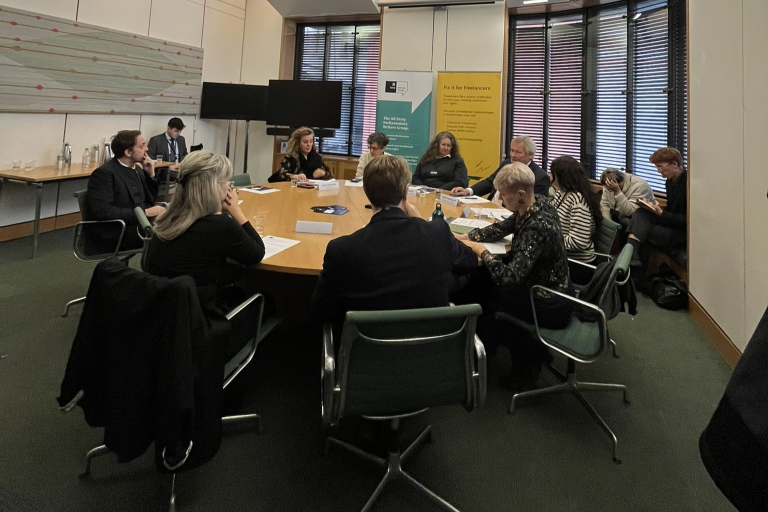The All Party Writers’ Group (APWG) held a meeting in Parliament this week to bring together industry representatives for a roundtable discussion on the need for a Freelancer Commissioner.
The APWG was joined by ALCS, Creative UK, Design and Artists Copyright Society (DACS), the Society of Authors and the Writers’ Guild in discussing the proposal.
The roundtable was chaired by Giles Watling MP and included freelance writer Anna Codrea-Rado and visual artist Charlotte Warne Thomas.
The APWG has supported the Freelancer Commissioner policy since its AGM in April and is actively exploring the proposal and campaigning for the creation of a dedicated Freelancer Commissioner as we believe it would be an effective solution to some of the unique challenges facing the freelancer community.
It was for this reason that the APWG gathered industry voices to hear more on the issues facing freelance creatives, the need for a dedicated Commissioner and what form it should take, as well as how to best move the campaign forward.
Charlotte Warne Thomas spoke about aspects of the freelancer workforce that are overlooked by UK policymakers: “We’re looking at a situation where visual artists, and I’m sure other freelancers too, are juggling a small income they get from their creative practice with other sources of income. European countries are well ahead of us on this in terms of supporting the creative freelancer workforce. The city of Berlin has just put forward more money than the whole of the UK for visual arts funding.”
Anna Codrea-Rado outline the unviability of making a living in freelance journalism: “You’d be hard pressed to find a report or a news story out there that a freelancer hasn’t touched… but the numbers don’t add up to make freelance journalism a viable career right now. I write for some of the top publications and my ability and skill increases, but my bank balance does not reflect that. I now make my money elsewhere because I’m exhausted trying to make this work.”
This was echoed by Lara Carmona, Director of Policy and Engagement at Creative UK, who said: “There is a need to sustain people and to put in infrastructure in place that is supportive of people’s rights to choose freelancing as a viable career”.
Nicola Solomon, Chief Executive of the Society of Authors, raised the key concern about the rights that freelancers often miss out on: “We need to look at the benefits system which is really broken. Sick pay, maternity pay, pensions. These are things you automatically signed up to when you are an employee but freelancers are missing out on.”
Reema Selhi, Head of Policy and International at DACS, discussed the government support that freelancers often miss out on: “A lot of artists earn far below the minimum wage. The cost of being an artist is expensive, you need studio space, you need materials etc. Public support, such as Arts Council funding, too often goes into bricks and mortar and waged employees, and far too little finds its way down to the freelance individuals who are actually producing the creative content.”
ALCS Deputy CEO Richard Combes said: “The number of people able to make a living in the creative industries is getting smaller. The Government tends to get it wrong by assuming there will always be people who want to create, therefore there will be this inexhaustible supply of talent and creativity. The ‘intrinsic motivation’ factor is diminishing. A Freelancer Commissioner would help to address this crisis.”
The discussion then moved on to the proposal for a freelancer commissioner to help address these issues.
Richard Combes said: “A Freelancer Commissioner would help because we have data to provide and practical suggestions to make but at the moment we are pitching to DCMS. Having a dedicated hub of knowledge that we can feed into would be incredibly useful.”
Anna Codrea-Rado agreed stating: “At a basic level, it’s to have political representation for freelancers. When chasing late payments or negotiating a contact, it can feel like David and Goliath for creators. There’s no political face for this community. A commissioner will elevate the status of freelancers. It needs to put onto the political agenda to stop freelancers feeling invisible.”
Lesley Gannon, Deputy General Secretary at the Writers’ Guild, continued: “We need someone who is seen as neutral, who can sound the alarm on areas of practice that have longer terms implications for the UK economy as well as the creative sector.”
APWG Chair Giles Watling MP concluded by voicing his full support for the Freelancer Commissioner proposal: “I intend to become a champion on creating a Freelancer Commissioner. I will push forward on this.”
The APWG have pledged to take this policy proposal forward and campaign for it.




